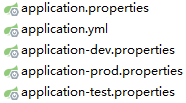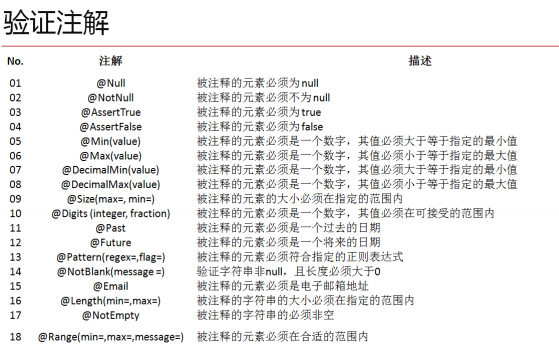初识
POM
<parent>
<groupId>org.springframework.boot</groupId>
<artifactId>spring-boot-starter-parent</artifactId>
<version>2.1.4.RELEASE</version>
</parent>
<!-- Add typical dependencies for a web application -->
<dependencies>
<dependency>
<groupId>org.springframework.boot</groupId>
<artifactId>spring-boot-starter-web</artifactId>
</dependency>
</dependencies>
@RestController @EnableAutoConfiguration //自动配置 public class Example { @RequestMapping("/") String home(){ return "Hello Boot"; } public static void main(String[] args){ SpringApplication.run(Example.class, args); } }
在resource下 application.properties
server.port=8522
server.servlet.context-path=/api
或者yml式配置
server: port: 8532 servlet: context-path: /api
多测试环境配置
spring.profiles.active=dev
使用该配置后,优先使用prod内的配置

读取自定义的配置信息
boot.name=bboott
boot.location=China
@Value("${boot.name}")
private String name;
@Value("${boot.location}")
private String location;
或者
@Component
@ConfigurationProperties("boot")
public class ConfigInfo {
private String name;
private String location;
public String getName() { return name; }
public void setName(String name) { this.name = name; }
public String getLocation() { return location; }
public void setLocation(String location) {this.location = location; }
}
@Autowired private ConfigInfo configInfo;
@RestController
@RestController即使使用 @Controller和@ResponseBody的组合,它会返回字符串 或者 json 。在做前后端分离时,我们会使用这个。
@RestController public class MVCController { @RequestMapping("/user") public User test03(){ User user = new User("黎明", 12); return user; } }
SpringBoot错误处理
数据验证

配置错误处理页面
@Configuration public class ErrorPageConfig { @Bean public EmbeddedServletContainerCustomizer containerCustomizer() { return new EmbeddedServletContainerCustomizer() { @Override public void customize(ConfigurableEmbeddedServletContainer container) { ErrorPage errorPage400 = new ErrorPage(HttpStatus.BAD_REQUEST, "/error-400.html"); ErrorPage errorPage404 = new ErrorPage(HttpStatus.NOT_FOUND, "/error-404.html"); ErrorPage errorPage500 = new ErrorPage(HttpStatus.INTERNAL_SERVER_ERROR, "/error-500.html"); container.addErrorPages(errorPage400, errorPage404, errorPage500); } } } }
异常处理
@ControllerAdvice public class GlobalExceptionHandler { @ExceptionHandler(Exception.class) // 所有的异常都是Exception子类
@ResponseBody // 以json形式返回错误信息
@ResponseStatus(value=HttpStatus.INTERNAL_SERVER_ERROR)
public Map<String,Object> handlerUserNotExistException(Exception ex){
Map<String,Object> result=new HashMap<String,Object>();
result.put("error", "error code");
result.put("message", ex.getMessage());
return result;
} }
Spring-boot 集成Mybatis
POM
<!--mybatis-->
<dependency>
<groupId>org.mybatis.spring.boot</groupId>
<artifactId>mybatis-spring-boot-starter</artifactId>
<version>2.0.1</version>
</dependency>
<!--connector driver-->
<dependency>
<groupId>mysql</groupId>
<artifactId>mysql-connector-java</artifactId>
</dependency>
在写好的dao层mapper上
mapper
@Mapper public interface TeacherMapper {。。。}
或者可以用mapper-scan
Application
@SpringBootApplication @MapperScan("com.xx.mapper") public class application {...}
Service
@Service
public class TeacherServiceImpl implements TeacherService {
@Autowired
private TeacherMapper teacherMapper;
...
}
Controller
@RestController public class MyController { @Autowired private TeacherService teacherService; @RequestMapping("/tea") public Object teacher(){ return teacherService.getAll(); } }
idea环境下开发,不会把静态资源弄到输出文件,所以运行会出问题
可以在pom下加入来解决
<resources>
<resource>
<directory>src/main/java</directory>
<includes><include>**/*.xml</include></includes>
</resource>
<resource>
<directory>src/main/resources</directory>
<includes><include>**/*.*</include></includes>
</resource>
</resources>
Spring-boot Transaction
1、在入口类中使用注解@EnableTransactionManagement
@EnableTransactionManagement public class application { public static void main(String[] args){ SpringApplication.run(application.class, args); } }
2、在数据库访问的service上添加注解
@Transactional @Override public int update(int id){ Teacher teacher = new Teacher(); teacher.setAge(12); teacher.setName("zhangsantt"); teacher.setLesson("bootttt"); int i = teacherMapper.updateByPrimaryKeySelective(teacher); int a = 10/0; return i; }
热部署插件
<dependency>
<groupId>org.springframework.boot</groupId>
<artifactId>spring-boot-devtools</artifactId>
<optional>true</optional>
</dependency>
集成Redis
<dependency>
<groupId>org.springframework.boot</groupId>
<artifactId>spring-boot-starter-data-redis</artifactId>
</dependency>
spring.redis.host=localhost spring.redis.port=6379 spring.redis.password=password
@Autowired
private RedisTemplate<Object, Object> redisTemplate;
@Override
public List<Teacher> getR(int id) {
RedisSerializer redisSerializer = new StringRedisSerializer();
redisTemplate.setKeySerializer(redisSerializer);
List<Teacher> teachers = (List<Teacher>) redisTemplate.opsForValue().get("allteachers");
synchronized (this){
teachers = (List<Teacher>) redisTemplate.opsForValue().get("allteachers");
if (teachers == null) {
teachers = teacherMapper.selectAll();
redisTemplate.opsForValue().set("allteachers", teachers);
}
}
return teachers;
}
集成Dubbo
开发dubbo服务接口
简单的写个service
public interface UserService { public String sayHi(String name); public User getUser(int id); }
用maven打成jar包(install)
开发提供者
1.创建springboot项目,并加入相关依赖(web)
2.加入springboot与dubbo集成的起步依赖
<dependency>
<groupId>com.alibaba.spring.boot</groupId>
<artifactId>dubbo-spring-boot-starter</artifactId>
<version>2.0.0</version>
</dependency>
3.在application.properties中配置zookeeper
spring.dubbo.appname=springboot-dubbo-provider spring.dubbo.registry=zookeeper://192.168.2.241:2181
pom中加入zookeeper依赖
<groupId>com.101tec</groupId> <artifactId>zkclient</artifactId> <version>0.11</version>
4.实现Service
@Component //spring的组件 @Service(version="0.0.1", timeout = 10000) //dubbo的注解 public class UserServiceImpl implements UserService{ public String sayHi(String s) {return "hi"; } public User getUser(int i) { return new User("大傻逼"); } }
为了可以implement需要在pom中导入我们在interface中创建的jar包
<dependency>
<groupId>com.xx</groupId>
<artifactId>xx-interface</artifactId>
<version>0.0.1</version>
</dependency>
application入口开启自动配置
@EnableDubboConfiguration //开启dubbo的自动配置
开发消费者
1.创建springboot项目,配置依赖
2.配置dubbo,同上
3.写controller
@RestController public class UserController { @Reference(version="0.0.1")// <dubbo:reference id="" interface=""> private UserService userService; @RequestMapping("User") public Object getStudent(@RequestParam("id") Integer id){ return userService.getUser(id); } }
4.application同样要开启dubbo自动配置,同上
集成拦截器
@Configuration
public class WebConfig implements WebMvcConfigurer {
public void addInterceptors(InterceptorRegistry registry) {
String[] addPathPatterns = {
"/boot/user"
};
String[] excludePathPatterns = {
"/boot/login"
};
registry.addInterceptor(new myInterceptor()).addPathPatterns(addPathPatterns).excludePathPatterns(excludePathPatterns);
}
}
集成Servlet
方式一:
servlet注解创建servlet后, application上注解扫描servlet
@WebServlet(urlPatterns = "/login") public class myServlet extends HttpServlet { @Override protected void doGet(HttpServletRequest req, HttpServletResponse resp) throws ServletException, IOException {} @Override protected void doPost(HttpServletRequest req, HttpServletResponse resp) throws ServletException, IOException {} }
@ServletComponentScan(basePackages = "com.xx.Servlet")
方式二:
不使用注解的servlet,略
使用Configure配置servlet
@Configuration public class ServletConfig { @Bean public ServletRegistrationBean whoServletRegistrationBean(){ return new ServletRegistrationBean(new whoServlet(), "/whoServlet"); } }
集成filter
方式一:使用注解WebFilte
@WebFilter(urlPatterns = "/*")
组件扫描
@ServletComponentScan(basePackages = {"com.xx.Servlet", "com.xx.Filter"})
方式二:同集成Servlet
编码
使用Spring提供的字符编码过滤器
@Configuration
public class filterConfig {
@Bean
public FilterRegistrationBean method01(){
FilterRegistrationBean registrationBean = new FilterRegistrationBean();
CharacterEncodingFilter characterEncodingFilter = new CharacterEncodingFilter();
characterEncodingFilter.setForceEncoding(true);
characterEncodingFilter.setEncoding("UTF-8");
registrationBean.setFilter(characterEncodingFilter);
registrationBean.addUrlPatterns("/*");
return registrationBean;
}
注意application扫描filter
只有当spring.http.encoding.enabled=false时,以上配置才可用
其实可以更简单
spring.http.encoding.charset=UTF-8 spring.http.encoding.enabled=true spring.http.encoding.force=true
写纯java项目
<dependency>
<groupId>org.springframework.boot</groupId>
<artifactId>spring-boot-starter</artifactId>
<version>2.1.4.RELEASE</version>
</dependency>
public static void main(String[] args) { ConfigurableApplicationContext ctx = SpringApplication.run(application.class, args); UserService userService = (UserService)ctx.getBean("userServiceImpl"); String hi = userService.sayHi("Spring java"); System.out.println(hi); }
或者在入口类实现 CommandLineRunner
关掉log中的banner
public static void main(String[] args) { SpringApplication app = new SpringApplication(application.class); app.setBannerMode(Banner.Mode.OFF); app.run(args); }
发布war包
继承SpringBootServletInitializer
@SpringBootApplication public class application extends SpringBootServletInitializer { public static void main(String[] args) { SpringApplication.run(application.class,args); } @Override protected SpringApplicationBuilder configure(SpringApplicationBuilder builder) { return builder.sources(application.class); } }
修改pom配置
<packaging>war</packaging>
然后 maven-install
jar包类似


 浙公网安备 33010602011771号
浙公网安备 33010602011771号